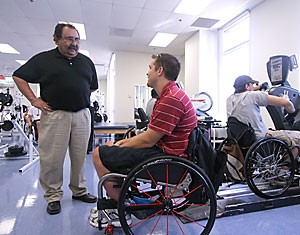United States Representative Raul Grijalva toured the Disability Resource Center yesterday to discuss a new pilot program designed to help reintegrate veterans of Middle East wars into mainstream society.
The DRC was chosen as the original site for the program because of its cutting-edge reputation in disability services, said Grijalva, D-Ariz.
“”It’s one of the premier services in the country,”” he said. “”(The DRC) has a long record of advocacy of integration and pioneering work.””
The pilot program would be a three-year plan. Disabled veterans from Iraq and Afghanistan – anywhere from 13,000-19,000 men and women, Grijalva estimated – will participate in the program immediately upon returning to the U.S.
The DRC staff will attend to the veterans’ needs as they continue their educations and secure jobs after graduation.
Although the program proposal still has to pass through the necessary legislative steps in Congress, Grijalva said he is confident it will continue as planned, adding, “”There is no opposition to this one.”” UA is an obvious place to launch the program because of its standing as a high-quality public institution, Grijalva said. Reintegrating veterans through a public institution is the most natural way to ensure their return to public life, he added.
While the program will be initiated at the DRC, Grijalva said that he would eventually like to see it replicated across the country, a gesture he said would show military veterans that they are considered a valuable asset.
“”When you talk about the policy of war, there are consequences that we are all responsible for,”” he said. “”We have a responsibility to the men and women who have served in the Armed Forces, and it starts here at the University of Arizona.””
Grijalva, the first congressional delegate to visit the DRC, was introduced and guided on the tour by Sue Kroeger, the DRC’s director.
“”It’s a real thrill to have Congressman Grijalva come here and recognize the work we do,”” Kroeger said. “”He’s really the one who has pushed for the best initiative, and without him we would still be talking about it rather than doing something about it.””
The program should not be thought of as mere physical rehabilitation, as the DRC will help veterans both mentally and physically re-adapt into society, Kroeger said.
Grijalva said veterans need an reintegration plan that is “”something creative, something new, something different.””
Dawn Huntzinger, the DRC’s assistant technology coordinator, said she believes the center has the ability to deliver quality reintegration from the very beginning of the veterans’ return.
“”The vets will be coming home and starting new lives,”” Huntizinger said. “”We are helping them to do the things they did before as they transition back to life.””









